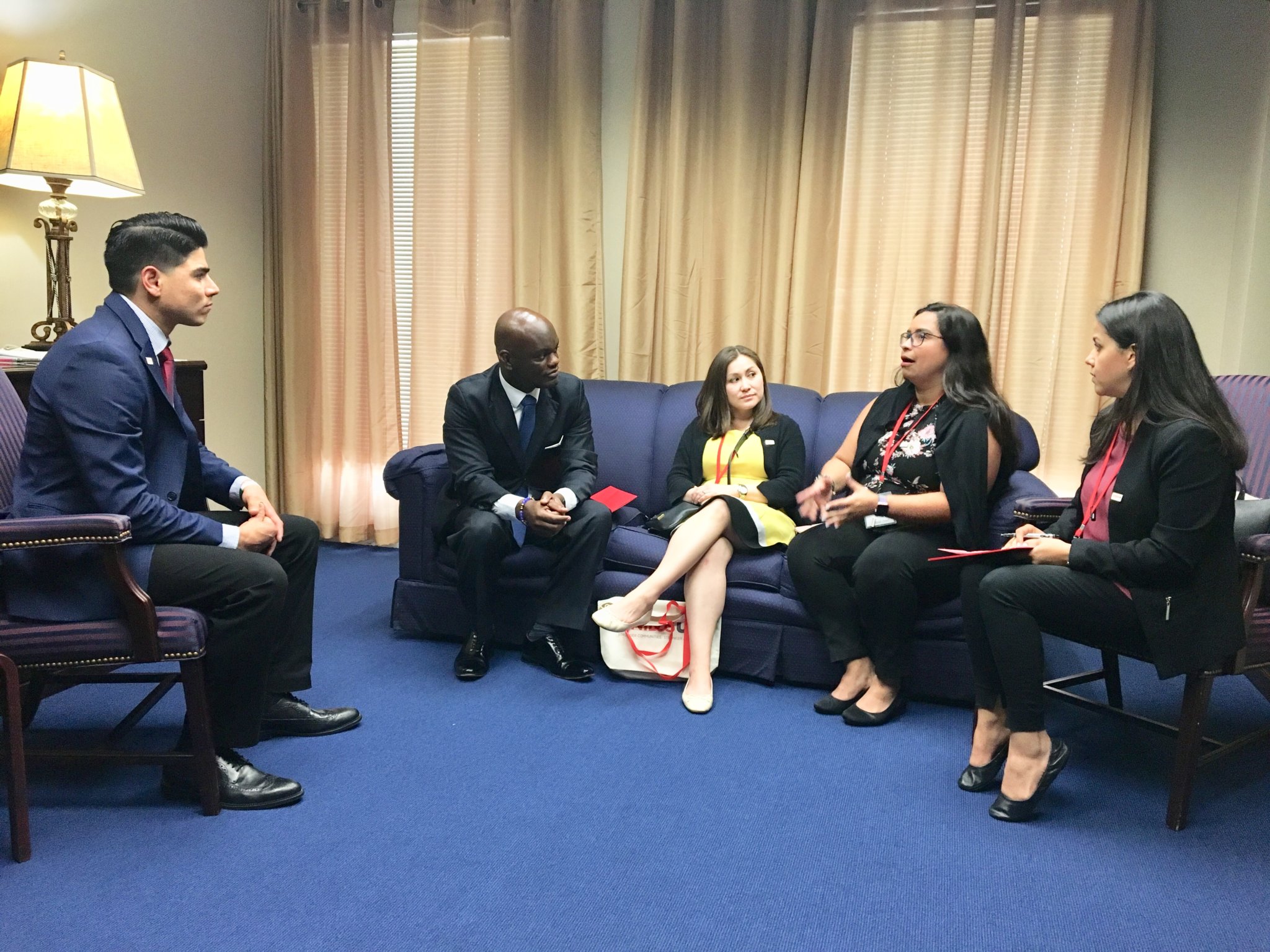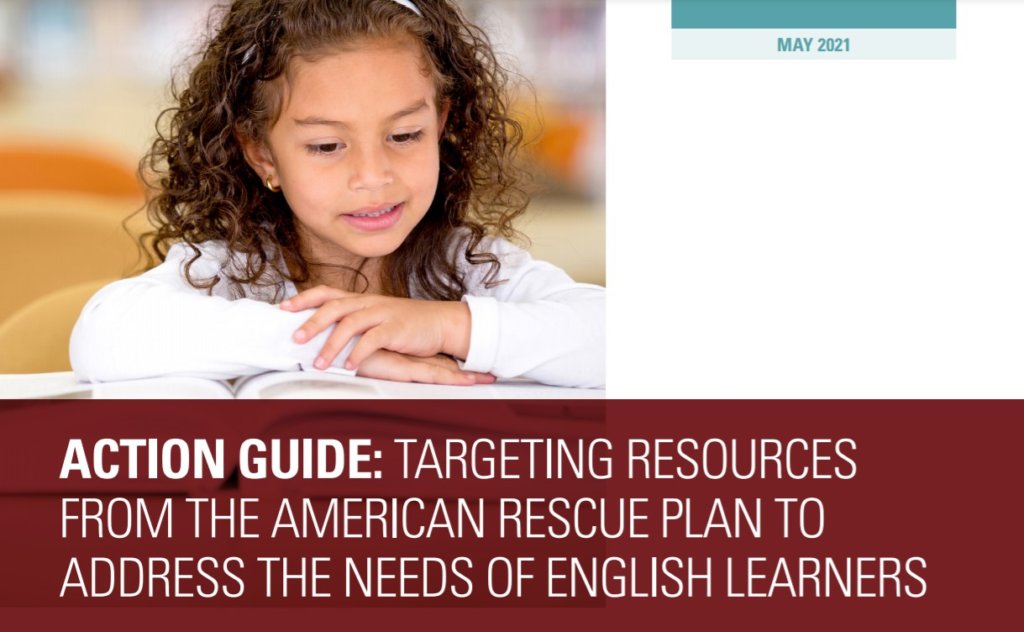UnidosUS Leads a Lobby Day in Florida State Capitol for Native Language Assessments

Three and a half years ago, Jossie Ramos, her husband, and their two children came to the Miami from Venezuela after local schools there kept closing or running out of resources.
“That was one of the biggest reasons why we left,” she says, “Unfortunately, the educational outlook in my country got really depressing.”
And while landing as Spanish speakers in a place as heavily Hispanic as Miami certainly eased the transition to a new country, her kids, Adolfo, now 16, and Victoria, now eight, weren’t prepared for the academic and emotional burden of doing all their coursework in English, not to mention testing into the right level for subjects like math or science when they couldn’t understand the English-language instructions.
“They weren’t prepared and neither were we,” recalls Ramos, herself an English learner. “Every time I tried to help, I just made it worse.”
In fact, Adolfo, now a junior, says the first few years were so tough that his normally good grades went down.
“At first I didn’t understand anything. I was just sitting there hearing everyone talking, and I was doing nothing all day because I didn’t understand,” he says.
His English comprehension is close to fluent now, and his speaking skills are catching up, but reading is still tough. It’s little wonder. On the night Progress Report paid a visit to his family, he showed everyone his required online reading program. It consists of a screen full of text with a white cursor moving quickly across the screen. He becomes embarrassed and agitated as he struggles to keep up with reading out loud, the words moving at a pace that would even challenge a native English speaker.

Scenarios like these are common in much of Florida, a state with close to 300,000 English learners in its K-12 school system. Now politicians are both sides of the aisle are speaking up in favor of developing a streamlined support system to help them through native language assessments.
A new native language assessment bill has been helping to drive that discussion forward this spring, and UnidosUS, the bill’s sponsor has been engaging in major efforts to continue that momentum. In fact, on April 4, the bill was the main focus of an UnidosUS Florida Lobby Day in Tallahassee.
Equipped with copies of the bill, talking points, and personal testimonies, Ramos was one of 27 education advocates, including leaders of Florida-based Affiliates and teachers to visit 49 legislative offices.
“I don’t even have words,” an emotional Ramos told Progress Report halfway through the day. “I never got to do anything like this before.” But she had plenty to say during the meetings, and policymakers were quite receptive to her testimony.
“Overall, the event was a huge success. We got more support behind our issues—especially for native language assessments—that I think will result in getting that legislation passed this session,” UnidosUS’s Florida Senior Strategist Jared Nordlund told Progress Report. “Some of the most conservative Republicans like Sen. Dennis Baxley (12th District) and Rep. Scott Plankton (29th District), were more understanding of native language assessments than we originally expected and didn’t see a problem supporting it.”
“Our first lobby day in Tallahassee was a huge success because of the dedication and commitment of our advocates to share their English learner stories and experiences,” said Amalia Chamorro, Associate Director of Education Policy for UnidosUS. “I believe we truly made an impact with legislators today to shed light on what it’s really like for English learners students in the classroom when they’re just starting to learn English, and the challenges their parents struggle with as they try their best to support their children’s education.”
A Win-Win for a Diversifying Economy
UnidosUS and its allies on this topic say native language assessments are a low-cost opportunity for improving student outcomes, raising school performance levels, and growing the Florida economy with a more competitive workforce. After all, according to the Florida Department of Education an estimated 82% of Florida’s English learners speak Spanish or Haitian Creole, which means the vast majority of English learner students would be covered simply by offering assessments in those key languages.
But Florida’s population continues to represent a broader and broader cross section of the U.S. population and of the world, noted Lobby Day participants. They’re hopeful that testing in the most widely spoken languages could lead the state to keep building out these services, something that could ultimately lead to advancements toward dual language learning. That, they contend, could do wonders for the state’s increasingly diverse population, and its efforts at gaining a stronger foothold in the U.S. and global economy.
For example, data from the Bureau of Economic and Business Research, shows that Asians—the majority of them Vietnamese—represent less than 3% of the overall population, but also represent Florida’s fastest growing sector of the population. And in 2018, Tallahassee, a city of just 191,000, resettled the highest number of refugees in Florida, taking in more than 100 individuals from countries as far away as the Democratic Republic of Congo, a nation where French and Africa’s popular trading language Swahili are widely spoken.

These foreign languages should be seen as assets, noted Haitian American delegate Gepsie Metellus, the executive director of Miami’s Sant La Haitian Neighborhood Center. In fact, she told the group how grateful she was to a teacher who pointed that out when she was struggling to improve her English as a child.
“Not everybody has your gift,” the teacher told her. “You don’t speak English right now but you speak French and Creole. Before you know it, you’ll have it.”

Republican lawmaker Rene Plasencia, who serves that state’s 50th District in the Florida House of Representatives, couldn’t agree more. In fact, the night before FL Lobby Day, he joined Lobby Day participants for a welcome dinner just to say so.
“The stronger our high school kids are as they get out of high school and go to college, the more confident they are, the more likely they are to be strong contributors to the economy,” said Plasencia.
Prior to becoming a politician, Plasencia spent 15 years as a teacher at Orlando’s Colonial High School, which had a very large non-native English-speaking population. He said he wants to ensure that students don’t get held back for a skill they will inevitably learn if they stay the course with their studies and their ambitions in America. In fact, he’d like to remove English language requirements for recently arrived students in their final years of high school.
“We need a skilled labor force, but we also need people who can speak multiple languages so that we can communicate in other people’s language,” he said, noting that Florida’s GDP just reached three trillion dollars, making it the 25th largest economy in the world.
Key Visits and Testimonials
Inside the capital building, one of the longest and most emotional meetings took place with Florida House of Representatives Minority Leader Kionne McGhee, a Democrat representing the state’s 117th District.
After a day of training and dozens of 5-10-minute meetings these diverse Lobby Day participants were making their points as a tight-knit team, cheering each other on, and also cheering for McGhee when Ramos went to address him in in Spanish and he assured her he didn’t need an interpreter.
“I’m the mother of two child immigrants, and we got to this country knowing our kids would have to learn English, but their transition here was quite difficult,” she told him. “Even though they’ve more or less overcome, I support organizations working on this cause because the reality is these students suffer as they try to maintain the same academic level they had back home, and so they’re not going to be as ready to go to college as their native English-speaking peers.”
“From the perspective of program manager with the high school students that we work with down in South Florida, I definitely see that,” said Marilu Villa, the program manager for the Homestead-based Mexican American Council (MAC), an UnidosUS Affiliate. “We have seniors that will not be getting a high school diploma. Their self-esteem drastically goes down after finding out and they don’t see a future for themselves.”
“Sometimes the parents need special tutoring for the children after school and they need to pay extra,” said UnidosUS Miami Coordinator Indira Navas. As a Venezuelan immigrant, an English learner, and a mother to a Miami-born baby, she knows it’ll take a village to raise a bilingual child, and she worries she’ll have the resources to do so.
“Seven out of 10 of the kids we’re talking about are U.S.-born American citizens,” chimed in MAC Executive Director Eddie Garza, hoping data points like this would help the Democratic minority leader reach across the aisle.

“On the educational front, we’re all there with you,” McGhee assured them, then chided, “I’m gonna be honest with you, I thought you all took my talking points. He said he would give full support to legislation aimed at protecting hardworking immigrants and English learners, regardless of their nationality.
“We’re family, and we’re fighting the good fight,” he told them as the group got up to go, and before they made their exit, he asked them all to gather for a photograph below a sign reading “Together.”



